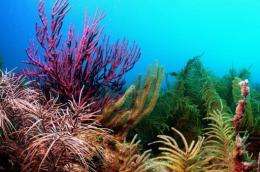Anxious monitoring near Florida coral reefs for oil spill

A team of scientists and divers for 20 days has been monitoring the world's third largest coral reefs at Florida's Dry Tortugas islands for signs of the Gulf of Mexico oil spill. Verdict: so far, so good.
"We didn't find any trace of the oil spill, that's the good news, but we'll have to keep our fingers crossed," said University of Miami coral expert Jerald Ault.
Ault headed a team of 25 scientists who made 1,700 dives combing the fragile coral reefs at Dry Tortugas National Park for signs of oil pollution damage.
The coral reefs stretching beyond the Key West islands at the tip of Florida are the third largest in the world behind Australia and Belize and a mecca for divers and fishing enthusiasts from around the world.
They face the Gulf of Mexico on one side, and scientists worry the massive oil slick oozing for the past two months from a damaged BP oil well could reach the Loop Current and spread beyond offshore Louisiana to southern Florida and up the eastern seaboard of the country.
"The loop current might bring some oil and if that occurs it would be certainly a bad thing for the corals," Ault said.
"It is hard to imagine something worse," said Billy Causey, regional director for the National Oceanic and Atmospheric Administration.
However, Causey believes there is no cause for concern.
"It is highly unlikely that the Keys will see a sheen or liquid form of any oil" from the Gulf of Mexico spill, he said.
Even so, just the thought of tar balls and oil slicks washing over shorebirds on the seven islands that make up the Dry Tortugas, makes National Park Service chief biologist David Hallac shudder.
"The magnificent frigatebirds and sooty terns that nest on the beaches are some of the main concern," he said, adding that other animals were also at risk.
"Four hundred sea turtle nest per season on the beach," the biologist said.
(c) 2010 AFP


















